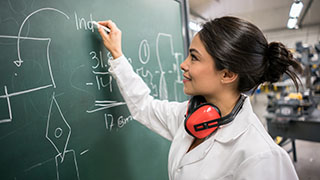While art education has typically been the first thing to go when times get tough, that doesn’t seem to be happening in central Illinois as students return to school amidst a global pandemic.
At Tremont Grade School, music teacher Christian Wilkey went to fairly extraordinary lengths to keep his kids singing in the face of strict public health mandates, starting with holding classes outside. Because singing and the consequent exhalation of droplets has been shown to be a very effective way to spread COVID-19, Wilkey decided that going outside is the only safe way to do it.
“We are not doing any singing inside whatsoever this year,” said Wilkey during an Aug. 18 interview. “We are going to be outside for my music class. It’s much safer than being indoors with all the recycled air, and it’s much easier to distance when you are outside.”
Musical instruments played by the mouth will not be used this year, and the other instruments will be disinfected between each use. On the second day of class in Tremont schools, Wilkey put his plan into action on a class of socially-distanced first-graders sitting on the patio in the school’s learning garden.
“So here’s the deal, boys and girls — you cannot share your Boomwhackers this year,” said Wilkey before handing out round plastic tubes used as percussion instruments. “Remember last year you used to be able to pass them around? Because we want to make sure no germs get on them, you can’t share them. So the Boomwhacker you get is the one you have the whole time. If you don’t like your color, you cannot trade with a friend. When you touch it, that’s it. When we are done, you bring this up to me and I spray it for the next class. Again, that means if you don’t like your color, can you trade it with someone?”
“No!” said the children.
“So you get what you get and you don’t throw a fit,” said Wilkey as the children chimed in to the familiar saying.
Because singing inside is not advisable, Wilkey has another set of lesson plans for when the weather is uncooperative.
“We will be listening to music, listening to composers, doing more of the music literacy aspect of it,” said Wilkey. “One of the first lesson plans I have is to play some music and ask them to express how it makes them feel. For the older kids, it will be more of a writing assignment; the younger kids will draw a picture.”
The pictures will be drawn using the child’s own crayons because classroom supplies can no longer be shared.
“In the art classroom we share everything, so that’s been something to think about,” said Tremont High School art teacher Nichole Roller.
Activities that require a lot of expensive equipment, such as printmaking, probably aren’t going to happen this year, said Roller. Even painting required a new routine.
“We’ll be using paint pumps, and I’ll be pumping the paint most of the time. During cleanup, they normally would crowd around the sink, and you can’t do that,” said Roller. “Art is an individual endeavor, but there’s a lot of community involvement when they work together, so we have to think about it differently. But we are willing to do whatever it takes to get the kids back in the classroom.”
The art and music teachers in Tremont spent many hours this summer poring over COVID-19 guidelines provided by the Illinois State Board of Education and the Illinois Department of Public Health while crafting their back-to-school plans. All the educators interviewed for this story agreed that the effort is worth it because art and music classes are important.
“We have to go beyond the core classes, beyond just the core academics, even at the elementary level,” said Brett Elliott, superintendent of Stark County Schools. “We have to expose kids, find their interest, feed their interest. We have to show them that there’s more to school than just math, science, social studies and reading. Those are very important, obviously, but developing the whole child, the well-rounded child, I think that’s very important, and it gives them the interest to come to school.”
In Stark County schools, band and choir classes will be held outdoors as much as possible. In the elementary school, the music teacher will rotate between classrooms rather than teaching in the music room, an effort to minimize the need to disinfect.
Not all districts are doing in-person art and music classes this fall, however. In the Princeville Community Unit School District, they are happening remotely. Though the high school music teacher hopes to do some rehearsals outdoors when the weather is good, most art curriculum will come in the form of assignments completed at home after school lets out at 12:30 p.m., said district administrator Shannon Duling.
“When we did our original plan, art, music and PE offered a lot of challenges. You’ve got typically big groups of kids, and you’ve got kids in a confined space, and we really struggled with how to do that safely, and we really struggled with the lunch,” he said. “So in the end, we decided to go ahead and end school at 12:30. We send lunches home with kids, so they can take them home and eat at home. So basically they get home and eat their lunch and then they work on either PE activities or art activities.”
Chromebooks, which allow for more remote interaction between students and teachers, are being sent home with the older kids, and there are plans to send them home with elementary students as well, said Duling.
“Our elementary art teacher is phenomenal with remote learning, and I know she’s anxious to get the Chromebooks home with the kids. We plan on sending them home, but we need to do some assessment and make sure these Chromebooks are set up with the right apps,” he said.
While it’s been difficult keeping art and music curriculum going during the pandemic, it’s important to try, said Duling.
“With so many of our kids, that’s where their strengths are. We don’t want to lose the opportunity for them to do the things that they are really good at,” he said.
Nine-year-old Amelia Vonderheide is glad music will still be a part of the curriculum when she returns to Tremont Grade School this fall.
“I just would miss it because I think music is amazing,” she said. “Music inspires me.”
Music is an important part of the school day, said Amelia’s mother, Sarah Vonderheide.
“They just need that change-up, to do something different in the day so they can stay fresh for their other work,” she said.
Not only does music provide a change of pace, it also has the power to brighten the spirit, a fact the Vonderheide family experienced during the shutdown last spring. Every day, Amelia’s music teacher, Wilkey, was in the family’s home virtually via Facebook to sing with Amelia.
“It was so huge to have that every day. It was just a great way to lift up the day. We always had that to be looking forward to,” said Sarah Vonderheide. “And it went beyond the kids — parents enjoyed it, too. I think everyone could come around it and just enjoy it, have that change of pace, a different way to engage yourself, and a bright spot … because you can’t sing silly songs and be grumpy.”





More Stories
Launch of Altura – a Blended Learning Solution from Macmillan Education India
How education can succeed in times of crises
Abdul Aziz Al Ghurair Refugee Education Fund Partners with Discovery Education